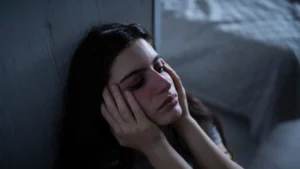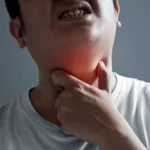The topic of “Does Menopause Anxiety Go Away” holds significant relevance in the lives of countless women worldwide. Menopause, a natural biological process marking the end of the menstrual cycle, brings with it a myriad of physical and emotional changes. Menopause anxiety, which encompasses feelings of unease, stress, and worry, often emerges during this transition.
This issue is vital because it directly impacts the quality of life for women experiencing menopause. The uncertainty surrounding whether menopause anxiety can be alleviated is a source of concern for many. It affects not only the women going through this phase but also their families and loved ones.
In this article, we will delve into the various aspects of menopause anxiety, its causes, and potential ways to manage it. By addressing this question head-on, we aim to provide valuable insights and support for those seeking relief and a better understanding of this challenging aspect of menopause.
What Is Menopause?
Menopause is a natural biological event in a woman’s life, marking the cessation of her menstrual cycles.
It typically occurs between the ages of 45 and 55, signaling the end of fertility. During menopause, a woman’s body undergoes significant hormonal changes, primarily a decline in estrogen levels.

Menopause Anxiety: A Closer Look
Menopause anxiety refers to the emotional and psychological distress that some women experience during this transitional phase.
It can manifest in various ways, including feelings of unease, tension, restlessness, and worry. This anxiety can be triggered by the uncertainty and physical changes associated with menopause.
Symptoms and Causes
- Symptoms: Menopause anxiety symptoms vary from person to person but may include increased heart rate, sweating, irritability, and difficulty concentrating.
- Causes: Several factors contribute to menopause anxiety, including hormonal fluctuations, life stressors, and personal history. Hormonal imbalances, especially a decrease in estrogen, can play a significant role in the onset of anxiety.
Read More: Menopause and Anger Toward Husbands: All You Need to Know
Impact on Daily Life
Menopause anxiety can significantly affect a woman’s daily life. It may lead to disrupted sleep patterns, reduced quality of life, and strained relationships.
Many women find it challenging to cope with these emotional changes, and it can hinder their overall well-being.
Does Menopause Anxiety Go Away
Natural Progression
Menopause anxiety is a distressing aspect of the menopausal transition, but the good news is that it often follows a natural progression.
Menopause as a Transitional Phase
Menopause itself is a transitional phase, and as the body adapts to the hormonal changes, anxiety can diminish.
For many women, menopausal anxiety tends to be most intense during the early stages of menopause and gradually lessens over time.
This can be attributed to the body’s adjustment to lower estrogen levels.
Coping Mechanisms
Managing menopause anxiety involves adopting effective coping mechanisms to alleviate distress.
Lifestyle Changes
Implementing lifestyle changes can significantly impact anxiety levels. Regular physical exercise, a balanced diet, and adequate sleep are essential factors that contribute to overall well-being during menopause.
These habits can help reduce anxiety by promoting hormonal balance and reducing stress.
Seeking Support
Talking about menopause anxiety with friends, family, or support groups can provide emotional relief.
Sharing experiences and feelings can be therapeutic and help women realize they are not alone in their struggles. Social support is a valuable resource in managing anxiety.
Medical Interventions
In cases where menopause anxiety is severe or significantly impairs daily life, medical interventions may be considered.
Medications and Hormone Therapy
Consulting a healthcare provider is essential for a thorough evaluation of anxiety symptoms. In some instances, medication or hormone therapy may be recommended to alleviate severe anxiety symptoms. These treatments aim to restore hormonal balance and improve emotional well-being.
Personal Stories of Overcoming Menopause Anxiety
Hearing personal stories of women who have successfully managed menopause anxiety can provide hope and inspiration.
Many women have shared their experiences and strategies for coping, offering valuable insights for those going through similar challenges.
Read More: How to Treat Menopause Body Odor?
Tips for Managing Menopause Anxiety
Self-Care Practices
Self-care plays a crucial role in managing menopause anxiety and promoting emotional well-being.
Diet and Exercise
Regular physical activity, such as brisk walking or yoga, can help reduce anxiety by releasing endorphins, the body’s natural stress relievers.

A balanced diet rich in fruits, vegetables, and whole grains provides essential nutrients and can positively affect mood and hormone balance.
Stress Reduction Techniques
Incorporating stress reduction techniques into daily life can be highly effective. Relaxation methods like deep breathing exercises, mindfulness meditation, and progressive muscle relaxation can help alleviate anxiety symptoms.
These techniques promote relaxation and reduce the body’s stress response.
Psychological Support
Seeking psychological support is essential for managing menopause anxiety effectively.
Therapy and Counseling
Therapy, such as cognitive-behavioral therapy (CBT) or talk therapy, can provide women with tools to manage their anxiety.
A trained therapist can help individuals identify and challenge negative thought patterns and develop healthy coping strategies.
Seeking Professional Help
In some cases, professional assistance may be necessary to address menopause anxiety comprehensively.
Consultation with a Healthcare Provider
Consulting a healthcare provider is crucial if anxiety symptoms are severe or persistent. A healthcare professional can conduct a thorough evaluation, rule out other medical conditions, and recommend appropriate treatments.
This may include prescription medications or hormone therapy.
Lifestyle Adjustments
Making lifestyle adjustments can contribute significantly to managing menopause anxiety.
Manage Triggers
Identifying triggers for anxiety and taking steps to manage or avoid them can help reduce anxiety symptoms.
This may include limiting exposure to stressors or adopting time-management strategies.
Supportive Relationships
Maintaining healthy relationships with friends and family can provide a strong support system during menopause.
Open communication and seeking understanding from loved ones can alleviate emotional distress.
Conclusion
In conclusion, menopause anxiety is a challenging but manageable aspect of the menopausal transition.
As women undergo hormonal changes during this natural phase of life, anxiety symptoms may arise, affecting their emotional well-being and daily lives.
However, understanding menopause anxiety, its causes, and effective management strategies can empower women to navigate this phase more comfortably.
Self-care practices like maintaining a balanced diet, engaging in regular physical activity, and utilizing stress reduction techniques play a crucial role in alleviating anxiety symptoms.
Psychological support through therapy and counseling offers valuable tools to address anxiety effectively.
When necessary, consulting a healthcare provider for evaluation and potential medical interventions can provide further relief.
Maintaining supportive relationships and managing triggers are also essential in managing menopause anxiety.
It’s important to remember that each woman’s experience is unique, and finding the right combination of strategies is key to managing anxiety effectively.
FAQs (Frequently Asked Questions)
1. Is menopause anxiety a common occurrence?
- Yes, many women experience some degree of anxiety during menopause due to hormonal changes.
2. Does menopause anxiety go away on its own?
- It often follows a natural progression and may improve over time, but individual experiences vary.
3. Can lifestyle changes really help with menopause anxiety?
- Yes, maintaining a healthy lifestyle can significantly reduce anxiety symptoms.
4. How can I find a therapist to help with menopause anxiety?
- Ask your primary care physician for a referral or contact mental health organizations for recommendations.
5. Are there medications specifically for menopause anxiety?
- Yes, some medications can be prescribed to alleviate severe anxiety symptoms during menopause.
6. What role does hormone therapy play in managing menopause anxiety?
- Hormone therapy may help alleviate anxiety symptoms by restoring hormonal balance.
7. Are there any natural remedies for menopause anxiety?
- Herbal supplements like black cohosh and mindfulness techniques may provide relief for some women.
8. Can menopause anxiety affect sleep patterns?
- Yes, anxiety can disrupt sleep, leading to insomnia or poor sleep quality.
9. Is menopause anxiety the same as depression?
- No, although they can coexist, menopause anxiety primarily involves feelings of unease and worry, while depression has distinct symptoms.
Medical References
- Freeman, E. W., Sammel, M. D., Lin, H., & Nelson, D. B. (2006). Associations of hormones and menopausal status with depressed mood in women with no history of depression. Archives of General Psychiatry, 63(4), 375-382.
- Hunter, M. S. (2003). Predictors of psychological symptoms: menopausal-specific or the result of change? Quality of Life Research, 12(8), 849-855.
- Soares, C. N. (2017). Mood disorders in midlife women: understanding the critical window and its clinical implications. Menopause, 24(7), 772-779.







